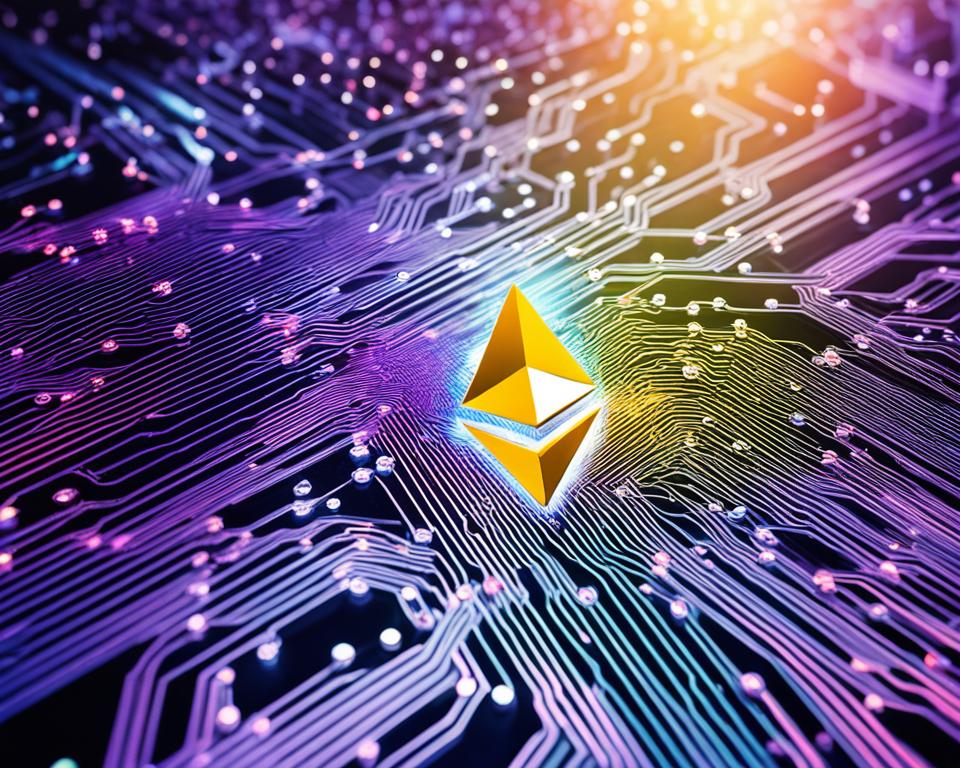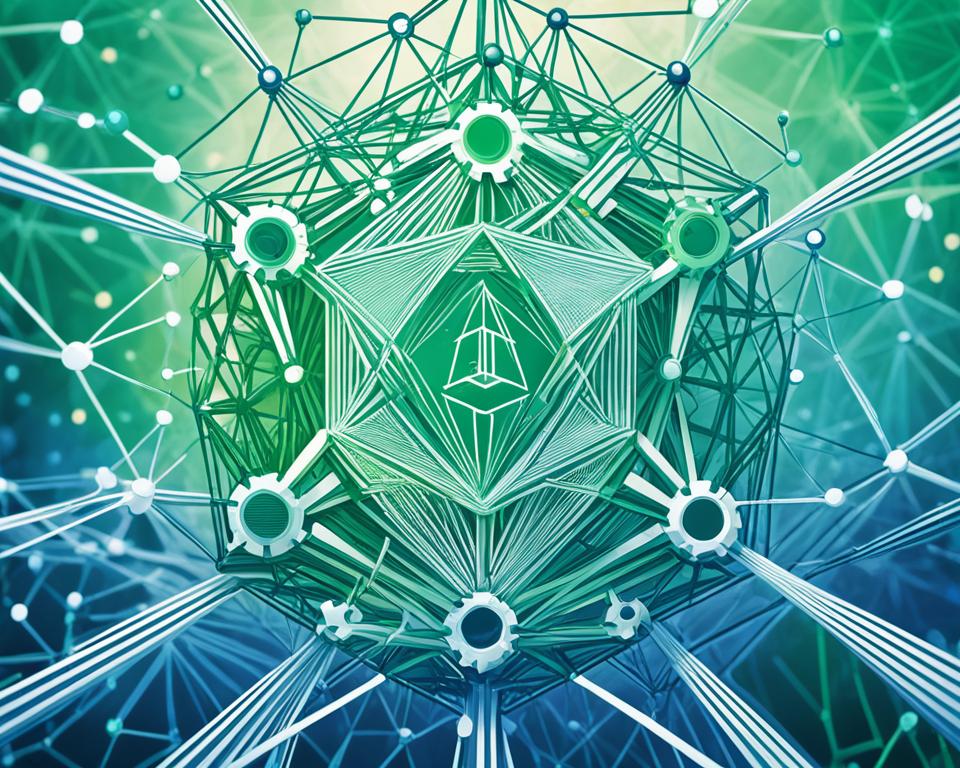Ethereum: The Revolutionary Blockchain Technology Explained

In the ever-evolving world of technology, one platform has emerged as a game-changer: Ethereum. This revolutionary blockchain technology has transformed the landscape of decentralized applications and smart contracts, paving the way for a more secure and efficient digital future. As you delve into the world of Ethereum, you’ll discover a powerful and versatile platform that empowers developers to create a wide range of innovative decentralized applications (dApps) and execute complex, self-executing contracts known as smart contracts.
Key Takeaways
- Ethereum is a decentralized, open-source blockchain platform that enables the creation and execution of smart contracts and dApps.
- Ether, the native cryptocurrency of Ethereum, powers the network and facilitates transactions.
- Ethereum’s Solidity programming language and Ethereum Virtual Machine (EVM) allow developers to build and deploy a wide range of decentralized applications.
- Ethereum’s gas fees and network congestion are ongoing challenges that the platform is working to address.
- Vitalik Buterin, the visionary mind behind Ethereum, has played a pivotal role in the platform’s development and adoption.
Unraveling the Fundamentals of Ethereum
Ethereum, the revolutionary blockchain technology, has captured the attention of developers, entrepreneurs, and enthusiasts worldwide. This decentralized, open-source platform has transformed the way we think about smart contracts and decentralized applications (dApps). Unlike Bitcoin, which primarily focuses on facilitating peer-to-peer digital payments, Ethereum’s scope is much broader, allowing developers to build and deploy a wide range of applications on its network.
What is Ethereum?
Ethereum is a blockchain-based computing platform that enables the creation and execution of smart contracts and decentralized applications (dApps). At its core, Ethereum is a distributed ledger technology that provides a secure, transparent, and tamper-resistant environment for the execution of these intelligent, self-executing contracts and the deployment of innovative decentralized applications.
The Visionary Mind Behind Ethereum
Vitalik Buterin, the co-founder of Ethereum, is widely recognized as a visionary in the world of cryptocurrency and blockchain technology. Buterin’s deep understanding of the limitations of existing blockchain platforms and his desire to create a more robust and versatile ecosystem led to the development of Ethereum. With his innovative thinking and technical expertise, Buterin has spearheaded the growth of the Ethereum network, making it a crucial player in the decentralized application and smart contract landscape.
Ether: The Native Cryptocurrency of Ethereum
Ether, the native cryptocurrency of the Ethereum network, plays a crucial role in facilitating transactions and powering the network’s operations. Ether, often referred to as the “digital fuel” of Ethereum, is used to pay for gas fees – the computational costs associated with executing smart contracts and decentralized applications on the Ethereum Virtual Machine (EVM). This unique feature of the Ethereum network has made it a popular choice among developers and enthusiasts seeking to build and deploy a wide range of decentralized applications.

| Key Ethereum Features | Description |
|---|---|
| Smart Contracts | Self-executing, programmable contracts that automatically enforce the terms of an agreement between parties, without the need for intermediaries or central authorities. |
| Decentralized Applications (dApps) | Applications that run on a decentralized network, leveraging the security and transparency of the Ethereum blockchain. |
| Ether (ETH) | The native cryptocurrency of the Ethereum network, used to pay for gas fees and power the execution of smart contracts and dApps. |
| Ethereum Virtual Machine (EVM) | A decentralized, Turing-complete virtual machine that executes Solidity-based smart contracts on the Ethereum network. |
Ethereum: The Decentralized Powerhouse
Ethereum’s true power lies in its ability to facilitate the creation and execution of smart contracts, a revolutionary feature that sets it apart from traditional blockchain platforms. Smart contracts are self-executing, programmable contracts that automatically enforce the terms of an agreement between parties, without the need for intermediaries or central authorities.
Smart Contracts: The Game-Changing Innovation
At the core of Ethereum’s ecosystem are smart contracts, which have transformed the way we think about transactions and agreements. These self-executing contracts, built on the Ethereum Virtual Machine (EVM), automatically enforce the terms of an agreement, ensuring transparency, trust, and efficiency in a wide range of applications, from financial transactions to supply chain management.
Decentralized Applications (DApps): The Future of Software
Ethereum’s decentralized applications (dApps) have ushered in a new era of software development, empowering developers to create innovative and disruptive solutions that challenge traditional business models. These dApps, built on the Ethereum blockchain, leverage the power of smart contracts to provide a wide range of services, from decentralized finance (DeFi) to decentralized social media platforms, all while maintaining the core principles of transparency, security, and decentralization.

Conclusion
As you’ve explored the remarkable capabilities of Ethereum, it’s clear that this revolutionary blockchain technology has profoundly reshaped the landscape of decentralized applications and smart contracts. By providing a robust and versatile platform, Ethereum has empowered developers to create a vast array of innovative and transformative dApps, disrupting traditional industries and paving the way for a more decentralized future.
Through the seamless integration of Ethereum, smart contracts, and decentralized applications, you’ve witnessed the true power of this technology to revolutionize the way we interact with digital systems. The Ethereum Virtual Machine (EVM) and the Ether cryptocurrency have become the cornerstones of this decentralized ecosystem, enabling secure, transparent, and efficient transactions and the execution of complex, self-executing agreements.
As you look ahead, the future of Ethereum and blockchain technology is filled with boundless possibilities. The continued development and adoption of this groundbreaking platform will undoubtedly lead to even more transformative applications, disrupting traditional industries and redefining the way we approach problem-solving in the digital age. By embracing the power of Ethereum, you and countless others can be part of this remarkable journey towards a more decentralized and equitable future.




